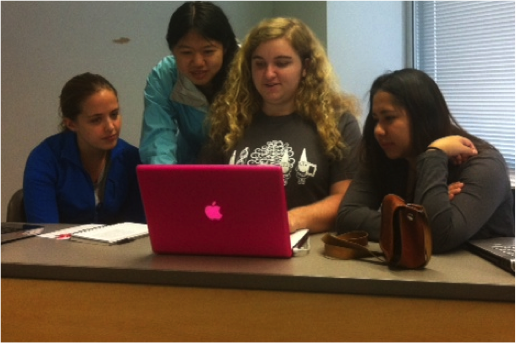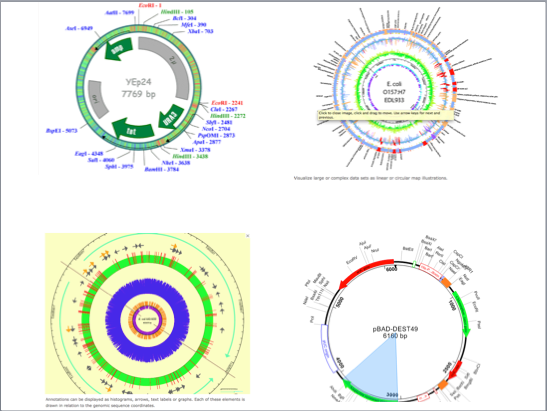
Kathy's Notebook
Timeline
Week of 5/31/2011
|
|
Summary
BU/Wellesley Synthetic Biology Bootcamp
 Members of the BU/Wellesley iGEM come together and work on their "Hello World!" application in Clotho. - 5/31-6/1: Team introductions; we learned the basics of CAD and basics of molecular biology and genetics.
- 6/2: We started learning the basics of Clotho, as well as more basic biology, focusing on the structure of a transcriptional unit. We split into teams and started exploring the format of Clotho.
- 6/3: Time to get into more details: How is TB involved in our research? Suma gave a brief powerpoint presentation on the global effects of TB, and an overview on the transcriptional regulation of TB. Also Traci talked to us more about the basics, such as the definition of a Biobrick, and objectives of the iGEM competition. Also, she gave an overview outline on wetlab protocol for this summer. Swapnil talked about how invertases work, and what would be a simple algorithm for computing potential permutations.
The comp team now has a good idea of what our goals are for the summer. Michelle and I will focus on observing the wet lab environment to see how a tangible user interface would potentially help research in a bioengineering lab. We may talk to more people later on in the summer about certain features to improve on G-nomeSurfer, and adjust our goals based on the needs of the wetlab.
|
Week of 6/6/2011
|
|
Summary:End of training; beginning of Wet-Lab Observations and Background Research
- 6/8: 1st lab meeting at BU with the wet-lab. Michelle and I spent a couple of hours in the wet-lab observing the wet-lab team. We took notes on the organization of the lab, team interactions, and where HCI tools would come best into.
- There were a couple of questions we had in mind:
- How useful would publications be when the team is starting to do research? Would they need a lot of background reading?
- What potential sources would they go to for publications? Would they prefer PubMed, GoogleScholar, or some other specific database?
- Found out that publications are not the main focus at the moment. They need to first learn about the equipment in the lab, and also how the Registry of Standard Biological Parts works.
 A sample variety of BLAST visualization considered. - 6/9: 1st HCI lab meeting at Wellesley- there was a general brainstorming session on BLAST visualization. After doing some background research on existing BLAST visualization, I divided the designs into categories based on linear vs. circular format, color scheme, and content organization. The circular BLAST visualizations are interesting, and we'll look more into GView and CGViewer. The team will keep the designs in m ind when considering how to design the paper prototype for the widget.
- Work for the rest of the week: I need to start fiddling with Geneious, to see the pros/cons of the design. What are aspects that are great that may inspire the next generation of G-nome Surfer? What are some things that won't work on a Tangible User Interface? We need to first understand the basic functions of Geneious before we know what to tweak about G-nome Surfer.
- Some members of the team are starting to develop the Extended Desktop; How do we envision this being used?
|
Week of 6/12/2011
|
- Summary: Started designing widget; continued with wet-lab observations; devising a plan for BLAST visualization
- 6/13: Continued looking at the features of Geneious and looking up related works. The circular chromosome design and the level of zoom in Geneious could potentially be interesting if we implement it in G-nome Surfer. Now G-nome Surfer is called G-nome Surfer Pro because we are now focusing on E. coli chromosomes.
- 6/15: Wellesley lab meeting #2. The team has divided into groups of two to work on aspects of the widget we pitched to Traci and the wet-lab. Different people are working on the chromosome wheel, hands of the wheel, chromosome stream, and the chromosome bar. Michelle and I will go to BU again.
- Questions to consider for the widget (and to ask the BU wet-lab members):
- Do we need a visualization level for the restriction sites as well? Do we need to zoom down to the nucleotide level? If not, what components are necessary on the widget, and which are optional?
- How would the wet-lab members interact with the surface?
- Would it be mainly used for individual research, paired search with a post-doc, group research, or some other form of interaction we haven't considered, since there is a space restraint in the lab?
- How do we look for genes? What methods seem intuitive? Do they want to look at specific restriction sites or genes?
- How will the abstract layer work with the widget? Do we use SBOL form for the abstract layer or not?
- 6/15: Wet-lab meeting #2 at BU with Suma. The group talked briefly about transformation, and updates on what is happening in lab, and how fluorescent proteins are displayed in the samples.
- A member of the wet-lab suggested that it would be cool to have barcodes for easier cataloguing. The barcodes would go on the plastic, and ideally, after the bar codes are scanne we can use that to pull up specific protocols related to each tube with a barcode. Michelle and I will look more into this.
- 6/16: Preparing for an extensive presentation on key features of Geneious.
|
Week of 9/19/2011
|
| Wiki freeze on Wednesday! AAAHHH
|
Other Important Links:
External Links
[http://twitter.com/BU_Wellesley Follow BU_Wellesley IGEM Team on Twitter!]
[http://partsregistry.org/wiki/index.php/Main_Page Registry of Standard Biological Parts]
BU_Wellesley IGEM Lab Notebook
BU_Wellesley IGEM Home
Wiki Tools
Upload Files
|
 "
"


